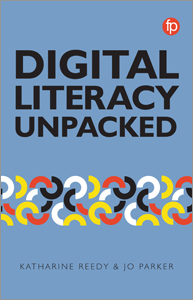
Primary tabs
You don't need to be an ALA Member to purchase from the ALA Store, but you'll be asked to create an online account/profile during checkout to proceed. This Web Account is for both Members and non-Members. Note that your ALA Member discount will be applied at the final step of the checkout process.
If you are Tax-Exempt, please verify that your account is currently set up as exempt before placing your order, as our new fulfillment center will need current documentation. Learn how to verify here.
- Description
- Table of Contents
- About the authors
- Reviews
Digital literacy is a powerful subject, which supports inclusivity, social mobility and digital citizenship globally. This book brings together thought-leaders and experts in the field, providing a blend of research and practice across sectors, and provides a valuable and timely insight into digital literacy and learning.
Digital Literacy Unpacked not only offers a snapshot of innovative approaches to digital literacy, but also intends to provoke discussion, encourage collaboration and inspire – whatever the role or context. The editors open up the whole area of digital literacy in all its kaleidoscopic richness, and provide diverse perspectives, content and ideas to inform thinking and practice. The cross-sectoral and global significance of digital literacy is a key theme of the book. Digital literacy is relevant to higher education, further education, schools, children, and the workplace – but crucially at its heart it is a citizenship and inclusion issue, necessary for the full participation and achievement of all in society. Content covered includes
- a discussion of terminology, institutional approaches, and existing frameworks;
- digital literacy in learning and teaching;
- copyright literacy;
- teaching the use of digital tools and curriculum design;
- critical approaches to literacy; and
- combating social exclusion using digital skills.
Part 1. Approaching digital literacy
Introduction
1. Defining digital literacy
2. The trouble with terminology
3. Institutional approaches to digital literacy
4. Partnerships for success
5. Approaching learning in a digital environment through threshold concepts
6. Frameworks for digital literacy
Part 2. Learning in a digital world
7. Librarians as leaders and mediators of digital / information literacy
8. Developing students’ digital literacy
9. Developing students’ digital literacy: the role of digital environments for teaching IL
10. The myth of digital natives
11. Openness and digital literacy
12. Embedding digital / information literacy
13. Engaging learners through gamification
Part 3. Developing staff digital capabilities
14. Digital capabilities for staff
15. Developing academic staff digital literacies through the curriculum
16. CreativeHE
17. Professional development for librarians
18. Transforming practice in schools through OERs
Part 4. Digital citizens and workers
19. Digital inclusion
20. Digital government
21. Lifelong employability in a digital world
22. Changing the world through digital literacy
Index
Katharine Reedy
Katharine Reedy is a digital literacy and learning design specialist at the Open University. She is a senior fellow of the Higher Education Academy and chartered member of the Chartered Institute of Library and Information Professionals (CILIP).
Jo Parker
Jo Parker is a senior library manager at the Open University Library, with responsibility for developing digital and information literacy strategy. She is a fellow of the Higher Education Academy, and a fellow of the Leadership Foundation. She has co-edited two previous books for Facet Publishing, UK.
"After reading this book, I wonder if the challenge to define digital literacy and where it fits alongside information literacy, media literacy and academic literacy is, in fact, necessary, because digital literacy could be the overarching concept for all the others. See if you agree. Highly recommended.”
— Journal of the Australian Library and Information Association
"Offers a solid foundation for learning about digital literacy concepts and theories, as well as provides examples of current projects and ideas for future applications."
— Online Searcher


